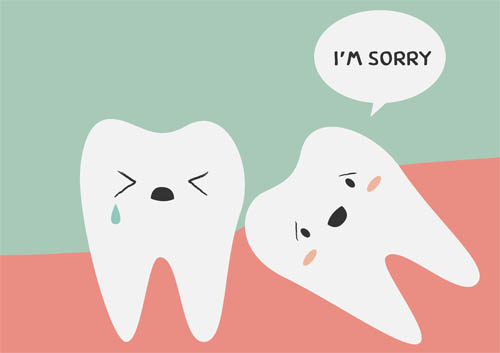August 23rd, 2017

You have a lot more freedom as a teenager than you did as a young child. You also have a lot more responsibilities, and one of your jobs is to take care of your teeth. Develop and maintain good dental habits now so you can have great dental health for life!
Tooth Decay
As a teenager, you risk tooth decay, or dental cavities, if you are not careful. In fact, 59% of adolescents aged 12 to 19 have at least one cavity, according to the National Institute of Dental and Craniofacial Research. Dr. David Shipper and Dr. Howard Vogel and our staff recommend keeping your teeth strong and healthy by brushing at least twice a day and flossing every day.
If you suspect that you have tooth decay, do not be embarrassed. Instead, ask your parents to bring you to Central Park West Dental to get it looked at. When you do not treat your dental cavities, they can turn into more serious problems. A severely damaged tooth may need to be treated with a root canal or even an extraction.
You can take easy steps to prevent tooth decay when you are at school or hanging out with your friends. Carry a bottle of water around with you so you can take a sip after you eat any kind of food. Choose water or milk instead of soda or sports drinks, and if you chew gum, select a sugar-free flavor.
Other Oral Health Concerns
You can probably think of many reasons why you should not smoke or use tobacco. Your oral health is another one. Tobacco gives you bad breath and stains your teeth yellow. It also increases your risk for gum disease and cancer of the mouth. Smoking even slows the speed of healing after you have dental procedures done.
Here are a few more tips that can keep your mouth attractive and healthy during your teen years.
- Drink plenty of milk.
- Limit candies and sugary snacks.
- Wear a mouthguard if you play a contact sport.
- Visit Central Park West Dental twice a year.
- Reduce infections and avoid piercing your tongue and lips.
You only get one set of permanent teeth in your life, so get in the habit of taking care of them now!
August 16th, 2017

If you suffer from sensitive teeth, you already know the frustration of having a type of pain that is hard to deal with. Because tooth sensitivity is sometimes unpredictable, you can't necessarily take medication to ward off the pain like you could if you just felt a headache coming on.
However, there is still something you can do about sensitive teeth. Use the following tips to help put your sensitivity and pain problems with your teeth behind you!
Use the Right Toothbrush: Select a toothbrush made just for sensitive teeth, or the softest bristles possible. This helps you avoid putting any extra pressure on your teeth or gums.
Choose a Special Toothpaste: There are several good options for toothpastes made just for sensitive teeth today. Usually, toothpaste formulated for sensitive teeth will be fluoridated and use a non-abrasive formula. The toothpaste will help with the pain usually associated with brushing and flossing if you use it regularly.
Avoid Trigger Foods: You may have noticed certain trigger foods that cause tooth sensitivity and pain for you. Avoid these foods whenever possible, and if you absolutely must eat them, try to consume them in very small quantities. Trigger foods may include:
- Foods with high acid content for example citrus fruits
- Very hot or very cold foods
- Hard or crunchy foods
Visit Our Office
If your sensitive teeth problem is too serious to manage on your own, a visit to our New York, NY office may be in order. There are a couple of ways Dr. David Shipper and Dr. Howard Vogel can help:
- Fluoride Treatments: We can put a special fluoride formula on the most sensitive areas to help make your enamel stronger and to help lower pain levels.
- Sealing Exposed Roots:In some cases, your roots become exposed due to a receding gumline, which in turn causes teeth sensitivity and pain. We can apply a dental sealant that protects the exposed roots and reduces your pain dramatically.
August 9th, 2017

If your teeth don't line up like they used to any more, you may be suffering from temporomandibular joint disorder, often called TMD. This is a term that can actually be applied to any condition that occurs because the temporomandibular joint (TMJ) is inflamed.
The temporomandibular joint is essentially the hinge that holds your lower jaw to your skull, and when it is inflamed or damaged in any way, it can be extremely painful. You have two temporomandibular joint, one on each side of your jaw, and it is typical to experience TMD in both sides at the same time.
Shifting of the Teeth
The reason that your teeth may not line up as they once did is that the ball and socket joints are often out of alignment and, as mentioned above, often very inflamed as a result. In order to correct the problem, Dr. David Shipper and Dr. Howard Vogel may prescribe dental orthotics such as a lower jaw splint.
Sometimes, the wisdom teeth can play a role in the shifting of the teeth as well. If shifting wisdom teeth is combined with TMD, it may be necessary to have your wisdom teeth removed. Dental splints may follow if your teeth don't shift back to their proper positions on their own.
TMD is certainly a difficult thing to deal with, so if you experience your teeth shifting, scheduling an appointment at our New York, NY office is the smartest course. We want to help you get your smile back, so give us a call anytime.
August 2nd, 2017

When your wisdom teeth start to emerge it can definitely be painful, but it can be even worse if your wisdom teeth become impacted. Impacted wisdom teeth are trying to erupt but are unable to do so because there is not sufficient room for them to emerge. This usually means that your wisdom teeth are painfully lodged in your jawbone.
While you may not see any real signs of the emerging wisdom teeth when they are impacted, what you can’t see can still definitely hurt you. Some of the indicators of impacted wisdom teeth are listed below.
- Jaw Pain: Pain in the back of your jaw is a common indicator of impacted wisdom teeth. The pain often concentrates in the area around your gums.
- Changes in the Mouth: You may notice some changes in your mouth when you have impacted wisdom teeth. Reddish gums, swelling in the jaw, bleeding gums, and bad breath can all be indicators that you are dealing with impacted wisdom teeth.
- Headaches: If you suddenly start having headaches, especially at the same time as some of the other issues mentioned above, they may indicate impacted wisdom teeth.
- Chewing Issues: Problems with chewing normally can indicate impacted wisdom teeth. If you are having trouble making the chewing motions because your mouth won’t quite open and close as easily as it used to, impacted wisdom teeth may be the culprit.
The Solution
If you are suffering from impacted wisdom teeth, the best solution is usually going to be removal. This is not a problem that will resolve naturally, and in fact, your pain and other symptoms may worsen as your wisdom teeth become increasingly impacted. At Central Park West Dental, Dr. David Shipper and Dr. Howard Vogel can review the details of wisdom teeth removal surgery with you and help you determine if this is the best solution for your situation.






 Website Powered by Sesame 24-7™
Website Powered by Sesame 24-7™